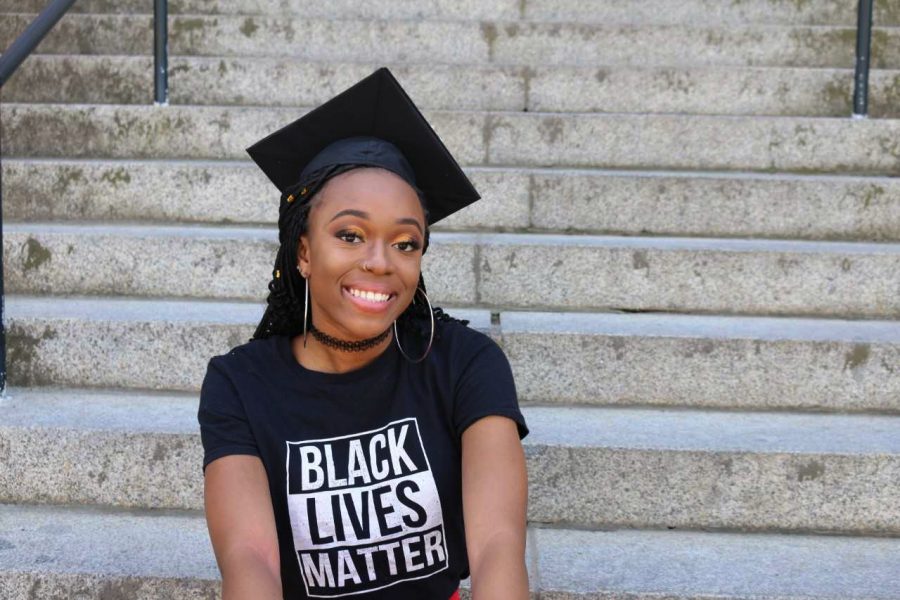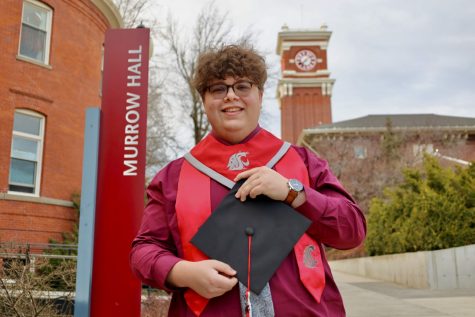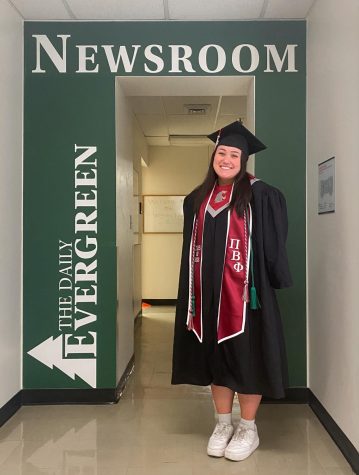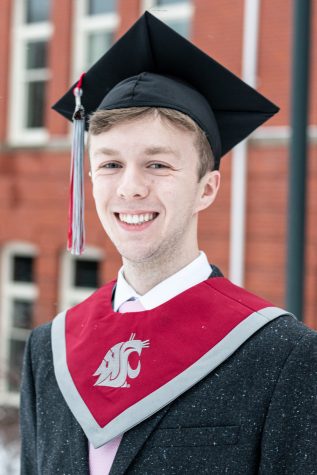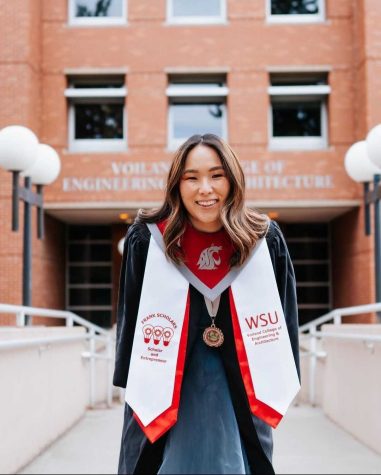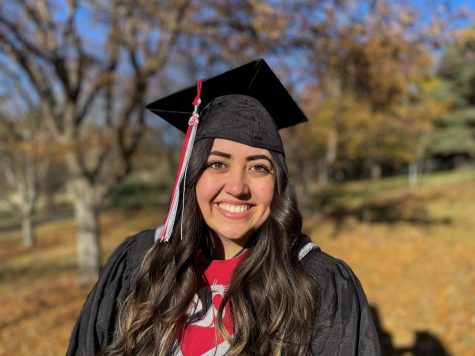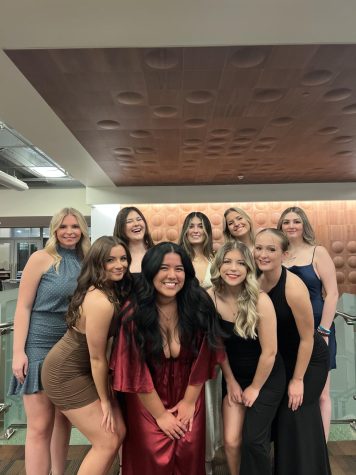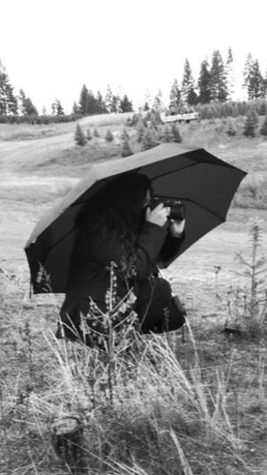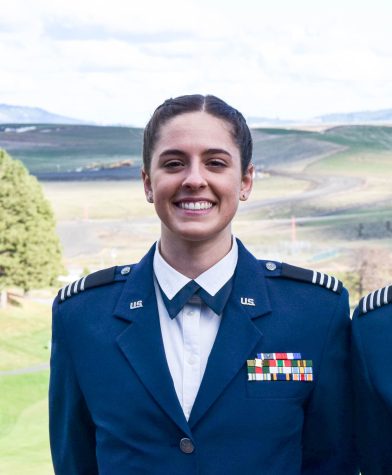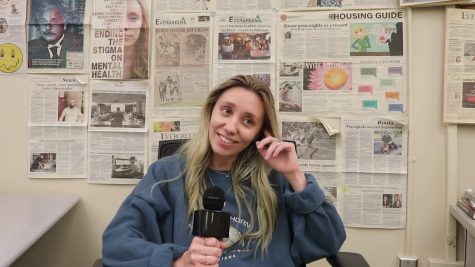Student activist reflects on impact at WSU
Emeka advocated for marginalized students, left ‘huge footprint’
Chijioke Emeka, a graduating basic medical sciences student who has been president of the Black Student Union for a year and a half, spent her time at WSU advocating for her fellow black students.
May 4, 2018
The first photo of Chijioke Emeka on Google is her LinkedIn portrait.
In the picture, she wears a dark jacket and a professional smile, a nametag pinned to her chest. On her profile she writes she is a basic medical sciences student at WSU. “The world is full of sickness,” and she wants to do something about it.
Scroll further through the images, and another shows her trying to cure a different kind of sickness.
It’s August 2017 in this photo. The school year has barely begun. The Black Student Union president stands on a bench, raised above a crowd and distinct against a background of sunlit trees. Her long, braided hair falls to the poster she holds in front of her: “Hear us!” it reads. She points off the picture toward the French Administration Building, her face calm but stern.
Tomorrow, Emeka will graduate. Soon she’ll begin applying to pharmacy school. But on Aug. 27, and for most of her time at WSU, she directed her energy toward standing up for the rights of her fellow black students.
She was among the organizers of the sit-in that day, when more than 100 students protested in the French Administration Building, calling on WSU to do more to combat racism and improve the campus climate.
They asked for cultural competency training, increased faculty and staff diversity and more support for multicultural programs. Emeka herself read the list of demands, and later was one of the leaders in negotiations with administrators.
It was far from the first time she took charge — long before college she juggled responsibilities. But at a predominantly white high school, her leadership wasn’t founded on the cultural mission she later discovered at WSU.
“Coming here and being involved had more of a centered purpose,” she said. “I found my passion working to elevate the black community.”
A born leader
Emeka grew up just north of Seattle, and when she was in middle school her family made the hop from Shoreline to Bothell. Her father, Samuel Ezeonwu, recalled the day shortly after the move when she came home and announced she would run for school president.
When he pointed out that no one even knew who she was yet, she was unfazed. She ran, and she won.
“From that point on,” he said with a laugh, “whenever she says ‘I’m going to do this,’ I do not doubt her or debate her.”
Her parents moved to Washington from the Nigerian village of Ekwulobia in the 1980s, but they still have close ties to the country. Emeka is fluent in the language Igbo (they rarely speak English in the house), and she has been to Africa twice to visit family.
She went on to hold student government positions and play sports in high school, and her heavy involvement carried into college with a newfound emphasis on making a home for black students. Among other things, she has served as president of the Black Student Union for a year and a half and worked as a student mentor in the African-American Student Center.
In her junior year, at what she calls the peak of her leadership, she received the President’s Award and the $1,000 Virginia E. Thomas Endowed Scholarship for her contributions to WSU.
Even now, as she wraps up her time as an undergraduate, she is working to charter a Pullman branch of the National Association for the Advancement of Colored People.
“I don’t even know how she does it,” said Jaade Archer, Emeka’s sister in the African-American sorority Delta Sigma Theta and her successor as BSU president. “She’s like superwoman sometimes.”
Archer added that others recognize her passion and the “huge footprint” she’s left at WSU.
“She’s a highly respected person in the community,” Archer said. “People listen when she has something to say.”
Building a community
When she arrived at WSU, Emeka wasn’t yet the unapologetic activist she would become. She stuck to her studies without plans of getting involved, at least not right away.
But then she discovered the Black Student Union and knew it was where she fit in. No matter what happened throughout the rest of the week, it gave her at least one day in a positive environment with people she could relate to.
“As a freshman that was something I really looked forward to,” she said, “and I think that just really made me want to be a part of creating and keeping that safe space available.”
She soon became a leader in the organization, and has been president since last spring. It isn’t all grand shows of activism like the sit-in. Much of her work happens behind the scenes, where she strives to create a welcoming environment and pushes others to get involved themselves.
Ezeonwu recalled that Emeka, the oldest of four children, constantly checked in on her younger siblings from an early age. In college, Archer said, Emeka looked after her fellow students in the same way, offering rides and tutoring or simply making sure everyone was safe and well.
“She cares about advocating for other people because it just feels right,” Archer said. “It’s like a calling to her.”
This mentality extends to her activism. Emeka described a cycle she’s witnessed since coming to WSU: marginalized students ask for what they need, administrators promise to give it to them, and the fervor dies down without any resolution. Then the issues resurface.
“I got tired of seeing the same things happen every year,” she said. “At this point we need to make them understand we can’t be silenced.”
Since the sit-in and negotiations, WSU has formed five committees to address the students’ demands. Emeka sees this as substantial action, albeit at a slower pace than she’d like.
To get to this point, she has sacrificed sleep, as well as free time she could have spent at game nights with friends, watching Marvel movies or doing community service.
When she looks at the progress in the black community, though, it all pays off. BSU’s membership has grown significantly since her freshman year, she said, and some have told her it’s their favorite part of the university. Others have said the group’s orientation for black students swayed their decision to enroll in the first place.
As she transitions to a new stage in her life, she’s confident that “it’s only up from here” for BSU, black students and marginalized people in general at WSU.
“Yeah, I lost a little bit of sleep, and yeah, I couldn’t go to every party,” she said. “But the outcome of those things was definitely worthwhile.”


